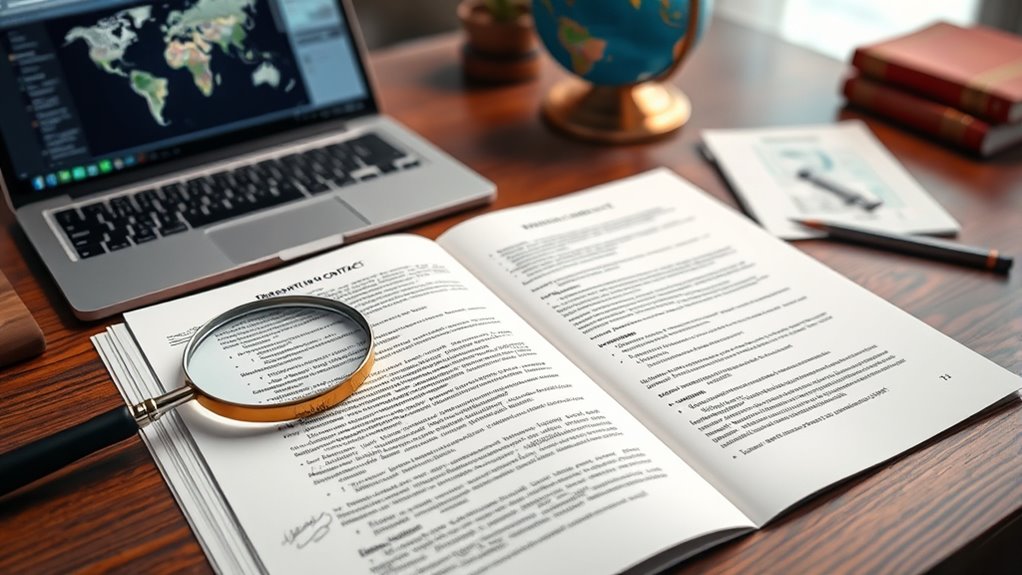Before signing a property contract abroad, you need to understand the governing law and jurisdiction to know which legal system will interpret your agreement. Conduct thorough due diligence on documents, ownership, and property condition to avoid risks. Validate the deed and transfer process according to local rules. Draft clear, simple contracts addressing language issues and specify dispute resolution methods. Staying compliant and aware of legal requirements helps protect your investment—keep exploring to learn more essential tips.
Key Takeaways
- Confirm the governing law and jurisdiction to understand how disputes will be resolved legally.
- Conduct thorough due diligence on property documents, ownership, and compliance before signing.
- Verify that the deed meets local legal requirements and properly transfers ownership rights.
- Use clear, simple language in the contract, specifying roles, obligations, and dispute resolution methods.
- Ensure compliance with local laws and include effective dispute resolution clauses, like arbitration or mediation.
Understanding Governing Law and Jurisdiction

Understanding governing law and jurisdiction is essential when signing an overseas property contract because these clauses determine which legal rules will govern your agreement and which courts will hear disputes. The governing law clause clarifies which legal system’s rules interpret and enforce your contract, reducing confusion and costly disagreements. Many choose English law for its predictability, but you can specify other recognized jurisdictions. The jurisdiction clause defines where disputes are resolved; an exclusive clause sets one court, while non-exclusive allows multiple courts. These clauses work together to provide legal certainty, prevent surprises, and manage risks. Without clear governing law and jurisdiction, courts may rely on ambiguous or conflicting rules, making dispute resolution unpredictable and potentially more expensive. Specifying the jurisdiction helps ensure that legal proceedings are handled in a familiar and accessible forum, which can also influence the outcome of disputes. Additionally, understanding international legal principles can further safeguard your interests in cross-border transactions, especially when applying different legal systems. Clear clauses on governing law and jurisdiction contribute to dispute resolution efficiency, minimizing delays and legal costs.
Conducting Due Diligence Before Signing

Before signing an overseas property contract, conducting thorough due diligence is essential to protect your investment and prevent future disputes. You need to verify documents, ownership credentials, and physical conditions to ensure everything is legitimate and compliant. Review legal descriptions, deeds, easements, and permits to confirm clear title and proper use. Check seller legitimacy through corporate documents and tax compliance. Perform a professional inspection to assess structural integrity, environmental risks, and utility status. Also, analyze financial details like rent rolls, taxes, and insurance to understand ongoing costs. Implementing a comprehensive due diligence process helps identify potential issues early, reducing risks and increasing confidence in your investment. Use this table to guide your due diligence process:
| Documentation | Ownership | Inspection |
|---|---|---|
| Title deeds | Seller legitimacy | Structural condition |
| Easements | Liens/mortgages | Environmental risks |
| Permits | Foreign ownership | Utility access |
| Zoning approvals | Tax compliance | Hazardous materials |
| Utility status | Encumbrances | Encroachments |
Validating the Deed and Transfer Requirements

How can you guarantee that the property deed you receive is legitimate and properly executed? First, verify it meets local statutory requirements for wording, language, and notarization. Check if a civil-law notary or government registrar needed to witness the deed’s signing. Ensure it’s signed by someone authorized to transfer ownership, and review signatures and powers of attorney for validity. Look at land registry or cadastral records to confirm a clear, unbroken ownership chain and identify any liens, mortgages, or restrictions—like easements or court orders—that could affect transfer rights. Confirm foreign ownership rules and any required approvals. Finally, verify all transfer taxes and fees are paid, and ensure the deed is correctly stamped, lodged within deadlines, and translated accurately if needed. Understanding property rights is essential to ensure your legal transaction is sound and protected.
Drafting Contracts and Addressing Language Issues

Clear and plain language is essential when drafting property contracts to prevent misunderstandings and reduce the risk of disputes. Use simple, direct words and avoid legal jargon that can confuse either party. Structure the contract with clear headings, subheadings, and numbered sections to make navigation easier. Ascertain you specify the official language of the contract and include authorized translations if multiple languages are involved, clarifying which version governs. Define all roles, obligations, and responsibilities explicitly, including deadlines and liabilities. Include provisions for confidentiality and termination rights. Understanding international legal frameworks helps ensure the contract’s enforceability across borders. – Specify the governing law and jurisdiction explicitly. – Tailor arbitration clauses for international disputes, detailing tribunal and location. – Clarify payment currency, methods, and schedules. – Address translation responsibilities and costs upfront, especially when dealing with documents that may involve translation services to avoid misunderstandings. Additionally, confirming the confidentiality clauses can help protect sensitive information during international transactions. An awareness of contract law principles relevant to the jurisdiction can further strengthen the enforceability of the agreement.
Establishing Dispute Resolution and Ensuring Compliance

Establishing effective dispute resolution mechanisms is essential when signing property contracts overseas, as it helps prevent costly and time-consuming litigation. Arbitration is a popular choice, where disputes are submitted to impartial arbitrators whose decisions are final and binding. Well-drafted arbitration clauses specify the institution, seat, language, and number of arbitrators, reducing procedural delays. Arbitration awards are enforceable in over 170 countries via the New York Convention, facilitating cross-border enforcement. Dispute Boards offer a proactive approach, monitoring the project and resolving conflicts early, saving time and costs. Additionally, ADR methods like mediation and conciliation promote cooperation and preserve relationships. Engaging legal experts ensures your clauses are enforceable, your compliance is maintained, and potential disputes are anticipated, safeguarding your investment abroad.
Frequently Asked Questions
How Do I Choose the Most Favorable Governing Law for My International Property Contract?
When choosing the most favorable governing law, you should focus on laws connected to the property’s location or your interests. Pick a jurisdiction known for fairness, predictability, and enforceability. Make sure the law is widely recognized internationally and aligns with your goals. Avoid laws that could cause ambiguity or bias. Clarify your choice in the contract to reduce risks, legal uncertainties, and disputes down the line.
What Are the Common Pitfalls in Verifying Property Ownership Abroad?
When verifying property ownership abroad, you might stumble over incomplete or unreliable land records, making it tough to confirm clear title. Be wary of complex deed validation processes, including proper notarization and accurate descriptions. Watch out for foreign ownership restrictions, zoning laws, and possible fraud risks. Always conduct thorough due diligence, verify seller identities, and consult local legal experts to avoid costly mistakes and confirm your investment is secure.
How Can I Ensure My Contract Is Legally Enforceable in a Foreign Country?
You want your contract to be clear, compliant, and enforceable. To do that, verify the foreign company’s registration and authority, specify the governing law, and include enforceable dispute resolution clauses. You also need to define responsibilities, incorporate international trade terms, and guarantee compliance with local export and import laws. By doing these, you paint a solid legal picture, making sure your agreement holds up across borders.
What Language Should I Use in International Property Contracts?
When choosing the language for international property contracts, you should use the official language of the country involved, like Chinese or Indonesian, to guarantee legal validity. It’s crucial to include a clear language clause that specifies which version controls in disputes. Also, consider providing accurate translations in a commonly understood language like English, ensuring all parties fully understand their rights and obligations, reducing misunderstandings and legal risks.
How Do I Effectively Resolve Disputes Across Different Legal Jurisdictions?
When resolving disputes across different legal jurisdictions, you should include clear dispute resolution clauses in your contract. Opt for arbitration under international frameworks like the New York Convention, and specify the arbitration rules, venue, and language. Also, consider including dispute boards or tiered mechanisms like mediation first. This proactive approach helps prevent delays, reduces conflicts, and guarantees enforceability of decisions, saving you time and money in the long run.
Conclusion
Before signing an overseas property contract, you need to cover all your bases—know the laws, do your homework, and get everything in writing. Don’t let the grass seem greener without understanding the risks involved. Remember, a chain is only as strong as its weakest link, so make certain every detail is clear and compliant. Being prepared now saves you headaches later—don’t put all your eggs in one basket.









